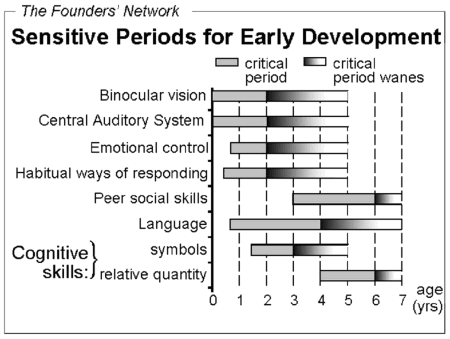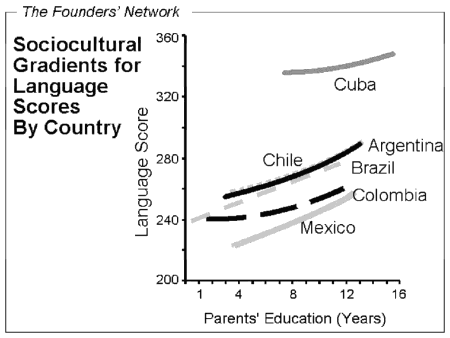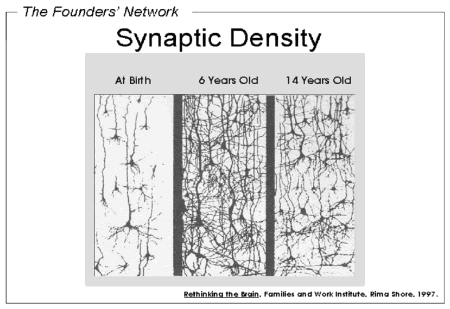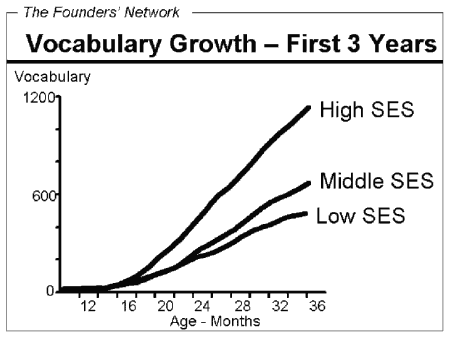Fraser Mustard was in town, Adelaide’s Thinker in Residence, until the end of March this year. A Canadian doctor (surgeon) by profession he has developed a post-retirement specialist interest in research on the well-being of human populations. He has become a crusader: his cause the absolutely vital importance of early childhood if we wish to undergird or improve human life on this planet - in his words - to ensure that we have all nations with healthy, competent, high quality populations.
His Early Years Report to the Canadian Government in 2000 established his reputation both at home and abroad as a voice to be reckoned with.
The lectures he has been giving in Adelaide draw heavily and most directly from his more recent paper, Early Child Development and Experience-based Brain Development - the Scientific Underpinnings of the Importance of Early Child Development in a Globalised World, written in response to the World Bank’s request for guidance in specifying parameters within which global policy makers should work. He has added material specific to the Australian situation to ensure we are factored into the world scene.
Advertisement
Bringing up children has, by and large, been a haphazard “natural” process in human history, differentiated for the individual child by the personality quirks of their own particular parents as these are constrained or organised by specific cultural patterns or norms.
But now that we have become clever enough to identify what causes what, we can and should do our best both to avoid damaging children, and to ensure we maximise their options for fulfilling and productive adult lives. Children themselves stand to gain, but societies in general also stand to gain from maximising human happiness and productivity quotients.
One of the most persistent follies in the child-rearing culture endemic in Australia is the asserted belief that children should be left to their own devices.
The claims that “children should be allowed to play”, that they shouldn’t be “hot-housed”, and so on, are thinly disguised excuses for ignoring them as much as possible. Since children’s primary method of learning how to become an adult is to watch and copy adults, this approach has predictably poor outcomes. Alienation and depression are common phenomena underlying the fabled “She’ll be right, mate” “Everything’s fine” bonhomie supposed to characterise the long and lanky sunburnt Aussie. We should learn how to do better than this.
The most important contentions that have been put through Fraser Mustards’s research filter and come out fortified with hard data are:
First, that the human brain is the most important organ in the human body, because it registers and responds to life experiences, archives consciousness, and bears ultimate responsibility for emotions and behaviours (conditioned or “spontaneous”) as well as for “purely” intellectual calculations. (I am reminded of Melford Spiro’s toss aside remark that “all beliefs are motivated”.)
Advertisement
Second, that whatever the genetic potential children get from their parents, their actual experiences dramatically and extensively change and modify that potential. The brain is malleable, not a genetic given.
Third, that the shaping of the brain, the orientation of the personality, the establishment of the main lines of life long interests, proclivities, emotional patterns, passions, and competencies occurs during the earliest phases of an individual’s life. Fraser Mustard reasonably asserts that the overall key period is “from conception to six years of age”. Freud, the Catholic Church and the BBC in its famed longitudinal study Seven Up claim the years up to the seventh birthday are the most important. But this is to quibble. By Fraser Mustard’s reckoning, the first three years are even more important than the second three (or four) years. In his words, “experience-based brain development in the early years (conception to age six) sets pathways in brain development that affect learning, health, and behaviour throughout the life cycle”.
Fourth, that general health (as measured, for example, by longevity), positive behaviour patterns (i.e. without criminal or violent strands) and literacy and numeracy skills (as identified, for example, by school years test regimes) are all linked indicators of, as well as target areas for improvement in, individual and social well-being.
It is because these three aspects of human life are linked that we can safely predict that those individuals who can read and write (and numerically calculate) are most likely to be long-lived (healthy) individuals who will enjoy a good life on this planet and contribute positively to society.
So making sure that everyone has the best possible chance to learn to read well is an intervention point, and has to be a major goal for social reformers of any and every ideological stripe and colour.
(A teaching method that systematically generates reading failure in over a third of the population is therefore due for major overhaul. Yet those who have proposed reform have been met with entrenched hostility and resistance from … teachers!)
Practical strategies to give your child a good start
If we explore the idea that getting your child off to a good start in life is to ensure that the better proportion of that child’s life’s battles are won, what practical decisions are involved for an Australian parent in 2007?
Child care.
Well, if one needs to get help with child care, one needs to tread very carefully. The idea that our present child care facilities are an adequate way of meeting a new human’s emotional, intellectual or any other needs is seriously misguided.
Fraser Mustard, as others before him, including the present author, cites the Romanian orphans as an extreme example of the emotional and intellectual deprivation deriving from institutionalisation, and he points out that we are working with a gradient in which our present child care arrangements may fall closer to the less damaging end of the spectrum, but nevertheless still register on the gradient of deprivation. Anne Manne’s recent book on motherhood has an excellent discursive treatment of this issue also.
Parent involvement.
Then we need to recognise that the greater the level of parent involvement in quality child care initiatives the better. Young children long to be with, and incidentally to learn from, their parents and family members. These rate far better than either non-family adults or non-family age-mate friends, for at least all the early years.
Forays into non-family friendships might begin seriously after the fourth birthday, but don’t take off till a good while after that, and even then ideally without losing the family base. Social interventions in the child care arena therefore have greatest chance of beneficial outcomes if they reach the child through the parent (not by by-passing the parent with apparently well-credentialled experts who can never be adequate parent substitutes).
Academic education and the early start strategy.
So what about education? If as a parent we want to have well-educated children, the next thing to be very careful about is NOT to leave the acquisition of language or language skills, or familiarity with numbers and the quantities they represent, and some basic manoeuvres in addition, subtraction, division and multiplication until the years of formal schooling.
If we do, we find that the relevant “windows of opportunity” for maximal grasp of foundational concepts has almost closed. The language skills area includes second languages. If you want your child to be bi-lingual, then exposure to the sounds of both languages ideally occurs between birth and seven months. Auditory pathways are established which can later be built upon with further levels of sophistication.
Fraser Mustard uses a chart to bring home the significance of the early years for the establishment of foundational neural pathways (synapses) in the years before school begins. It is here that we find an explanation for John Stuart Mill successfully learning Greek and Latin before he was five - his father began teaching him when he was three.
This is why Oprah Winfrey has had such a successful life - her grandmother taught her to read when she was three-years-old.
It is why Tiger Woods is such a superb golfer - his father had him out in the backyard with a golf stick as a three-year-old trying out different strokes.
Mozart, you remember, not only had music all around him from birth but also had an ambitious father teach him directly, probably before, but certainly after his third birthday.

This chart bears considerable contemplation.
From it we can see how basic dispositions are set earlier than cognitive patterns. After the third birthday it’s going to be harder to change personality style. But parents can look to successfully building foundational language and number skills with relative ease through the third to the sixth or seventh birthday.
In checking the “window” for the central auditory system, we can see why exposing the baby in your arms to the sounds of a second language works to lay the foundations for easy acquisition of that second language when the time comes.
My own observations of young children led me to conclude that teaching children the alphabet and its uses was better begun at three, and that teaching keyboard skills was easiest if you began at four, and these ideas seem to have some support here also (assuming that music and math register in the same part of the brain).
One can also see why “child care” facilities are so fraught for very young children. The “window of opportunity” for maximal comfort in acquiring “peer social skills” doesn’t even open until the third birthday. This is why Fraser Mustard stresses the necessity of involving parents in the early years of any childhood educational program.
He cites the Cuban experience as instructive here. In Cuba Fidel Castro prompted the establishment of family day care centres where parents could go with their children so that both could learn - parents could learn optimum parenting methods, and children could learn from engaging in play-based activities in which their parents actively participated. The results have been astonishing. Cuban children check in with language skills and general competency greater than any other Latin American country.

Fraser Mustard would like the government of any caring society to finance something similar. His experience has been that funding is given grudgingly and withdrawn arbitrarily. He notes the irony of this unfortunate outcome of democracy when compared to the stunning advantages obtained through (benevolent) dictatorship. But the moral for our parents must be that they need to observe, note and act appropriately to ensure the well-being of their own children, since at the moment social provisioning is seriously inadequate.
(The highly successful outcomes of home-schoolers could be noted here as relevant supportive evidence on this. Home-schooled children are now at college and university levels in sufficient numbers for the success of the home-schooling strategy to be visible. In the US tertiary admissions officers now give home-schooled applicants preferred entry status over “normally” schooled high school graduates.)
Fraser Mustard has used another graphic, this one drawn up by Rima Shore (1997), to show how brain development research data can explain why best teaching practice must include an early start. When synaptic densities are mapped, we see that at birth we are looking at unconnected neurons. The rapidity of brain growth in the early years leads to a mass of dense connections by six years of age. Neural pathways register the totality the child has experienced or noted in the years since birth.
There may be a kind of plateau, a resting point, that follows here (i.e. just when the child is usually brought into a formal schooling system the brain is taking a holiday). And then what is spoken of as a “culling” process takes place, whereby the strongest neural pathways (entrenched observations, memories, rules for living well, practiced skills, and so on) are retained, and unconnected neurons are reabsorbed and effectively disappear.
This allows the brain a greater clarity for adult operational usage, but it also means that new kinds of knowledge are acquired with greater difficulty (while building on kinds of knowledge already acquired is fine because the neural pathways are already established and traversable, and open to the addition of extra details). So the greater the density of neural connections (pathways) in the brain before the culling begins, the more is retained, and the greater the intellectual sophistication, knowledge, judgment and capacity for further learning of the near-adult and adult individual.

The achievement gap
One of the issues that has been taken as a major challenge by the USDE (United States Department of Education) is the “achievement gap” between high achievers and low achievers. This is important also in Australia and the UK, although not for the same reasons: in the US the achievement gap has ethnic links - Asian and white kids do better by a quantum leap than black and Hispanic children.
Efforts at eliminating this gap have been various. But it is now reasonably clear that improving or intensifying educational inputs either in primary or high schools is far less useful than working out how to prevent the gap emerging in the under-five (or under-three!) years.
The issue here is that when children step across the entrance to the school room door their fate is nearly scripted for them at that moment. Either they will do well and enjoy school, or do poorly relative to their peers, feel miserable, and stand condemned to experiencing their school years as some kind of jail sentence.
In the US Head Start is said to have largely failed to address the achievement gap, and this is being blamed on the staffing, which has been by low paid child care workers who have given primacy to good meals and self-esteem boosting without actual “academic” input. Be that as it may, in Australia the primary indicator for our achievement gap is not race but money, or more accurately the SES (socio-economic status) of the parents and neighborhood.
Since everything builds on previous learning, one can understand that when one child arrives at school with a vocabulary double that of a class mate, that child will immediately feel warmly about further learning, while the other will feel on edge, a little intimidated, and defensive - not a good recipe for getting the most out of school.

Now this kind of information has been increasingly available to researchers and academics over the last decade or so. One conclusion that has been drawn by many who have seen a new career path opening up is that early learning centres may be the way to go. Such early learning centres may take children as early as three or more commonly at four years of age, for five half or full days a week.
While four-year-olds may find this easier to handle, this is a long time for a three-year-old to be separated from his or her primary care-giver (mother). We are faced with the dilemma that children are intellectually ready to learn all kinds of things, but are not yet socially mature enough to handle multiple strangers without the presence of a family member (mother).
Parents, it would seem, need to be supported in their original natural role of being the child’s first teacher. The more the care-giving parent (mother) can be with and teach her children, the more we will have high-quality, high-functioning individuals making up the adult population.
The call for the establishment of universal pre-K options needs to take the disjunction between cognitive and emotional readiness of the child into account, and modify its agenda accordingly.
The kind of centres (Early Childhood Development and Parenting Centres) Fraser Mustard has in mind are a different thing altogether. Here we would have a focus on general developmental goals, we would have participant parents present (while simultaneously learning parenting techniques), attendance would not be fulltime, and staff would be four-year tertiary credentialed, including in neuro-science. But there would not necessarily be any academically specific learning for the children.
Parents with academic enthusiasms could easily, however, add their own literacy and numeracy components to the precursive “readiness” exercises of such a centre.
The most obvious practical message is that Australian parents, as well as Bill Gates, need to throw out the notion that you can improve high school performance levels by improving high schools. While, clearly, you can’t get good Year 12 results without good teachers and facilities, the real sine qua non is bright intelligent students. And you only get these from ensuring maximum encouragement and attention to newborns and under-fives.